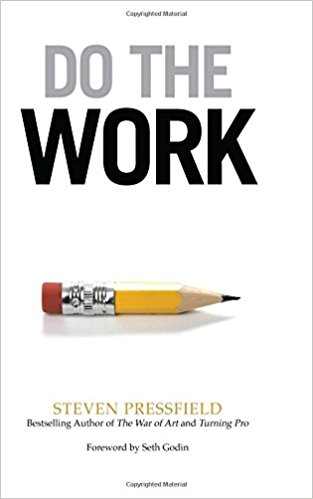Do the Work Summary
5 min read ⌚
 Overcome Resistance and Get Out of Your Own Way
Overcome Resistance and Get Out of Your Own Way
You– with your big brain and your tiny heart – is your own worst nightmare! You over-rationalize things when you don’t need to – and you don’t believe yourself when you must.
Steven Pressfield says: it’s time you put an end to this. And “Do the Work”!
Who Should Read “Do the Work”? And Why?
“I didn’t have the time to write it out, which is a shame,” closes one touching Primo Levi poem. “It would have been a fundamental work.”
Maybe you have one lying around in a drawer as well. And procrastination and distractions stop you from putting the effort to complete your masterpiece. You don’t want to end up like the speaker in Primo Levi’s poem, don’t you?
If so, “Do the Work.” Or read Steven Pressfield’s book and learn how.
About Steven Pressfield
Steven Pressfield is an American writer, famous both for his fiction and non-fiction works. Most of the former deal with historical subjects, mostly taken from Ancient Greek history.
is an American writer, famous both for his fiction and non-fiction works. Most of the former deal with historical subjects, mostly taken from Ancient Greek history.
“The Gates of Fire,” for example, is about the Battle of Thermopylae, while “Tides of War” about Alcibiades and the Peloponnesian War. “The Virtues of War” and The Afghan Campaign” is a pair of books which focus on Alexander the Great’s conquests.
However, he’s probably most famous for his debut novel, “The Legend of Bagger Vance” which was turned into a successful movie in 2000.
Unsurprisingly, Pressfield’s debut nonfiction book, “The War of Art” dealt with writing creative fiction and breaking through creative barriers. We’ve already featured it in our list of “6 books that will turn you into a great writer.”
“Do the Work” is its follow-up.
“Do the Work Summary”
Are you familiar with things such as blank-page (or: blank-screen) syndrome or, even worse, writer’s block?
If so, the good news is you’re not alone. Basically, every writer who has ever lived has experienced this – and much more. And the even better news is that Steven Pressfield, a famous contemporary author, provides you with a manual on how to beat all of it.
Or, to use his introductory analogy to describe the objective of the book better:
“On the field of the Self stand a knight and a dragon. You are the knight. Resistance is the dragon.”
Resistance is a concept Pressfield has invented himself; and it’s an important one to many, to state the least (Godin, Kelley, Kiyosaki, Lechter, Trapani…) Basically, it’s an umbrella term for all those obstacles standing between you and your finished project.
Your number one enemy, your arch nemesis, the Darth Vader to your own, personal Anakin Skywalker.
In a nutshell, Resistance is a monster and it manifests itself in many different forms. It can be doubt or self-criticism, it can be rational thinking or a cup of coffee with a friend.
Actually – anything which takes you away from doing the work!
Motivation is a good way to start fighting it. Passion, perseverance, grit – you know the drill. Interestingly enough, even negative traits can do the work (pun unintended).
For example, stubbornness. It was what helped Charles Lindbergh fly over the Atlantic and Steve Jobs built “Apple.”
You know why?
Because they didn’t overthink it! In the case of Lindbergh, he didn’t even prepare well enough. And that made all the difference! Because thinking too much and excessive preparation is usually an enemy – especially when you are a writer. Putting words on paper – now, that’s the actual job.
Don’t worry: you’ll have time to reflect on them the next morning. And then do some more writing.
Because the real enemy, your own worst nightmare – is, after all, you. You are free to do whatever you like – really, you are! – and, for some reason, you choose to be subjugated by Resistance.
Don’t do it!
Fight back!
A good way to do this is by asking yourself two questions: “how badly do you want this?” and “why do you want this?” May the answer to the former be “I’m totally committed” and to the latter “Because I have no other choice.”
Otherwise, you don’t want it. And you won’t do it.
Key Lessons from “Do the Work”
1. You are the Knight. Resistance is the Dragon.
2. Do the Work Now. Reflect on It Later.
3. Facing the Big Crash
You are the Knight. Resistance is the Dragon.
If there’s a project which is really important to you – a diet regime, an entrepreneurial project, or writing your masterpiece – then, just as sure, there will be resistance on your path to complete it. It’s just the way things go: passion and commitment breed fear and doubt.
Even at 75, Henry Fonda supposedly threw up before every stage performance!
However, you can beat Resistance. Because, as dragon-like as it is, you have all the chivalric traits you’ll ever need!
Do the Work Now. Reflect on It Later.
Now, “Do the Work” is specifically written for writers. And when it comes to them, Resistance has many names: self-doubt, writer’s block, self-censorship… So, it’s no surprise they’re usually pictured as neurotics, right?
However, the problem – says Pressfield, one of their peers (so, he should know) – is fairly simple. Namely, writers don’t differentiate between what is their work and what is not. While carpenters (for example) would never mistake thinking about making a chair for work, writers will.
And they do. Even though they should not. They should simply start putting words on paper. Because even thinking about them later will result in editing. Thus, more work!
Thinking about the resistance of the blank piece of paper, however, will result in nothing but more resistance!
Facing the Big Crash
It will inevitably come.
No matter what you do or how much you prepare for it, the Big Crash will one day appear at your doorstep. It may be a technical glitch, burned manuscript, a family problem – you name it!
First of all, the bad news: you can’t really prepare for the Big Crash.
However, the good news is – knowing about it will help you overcome it. Look at it this way – if you wanted it badly before the Big Crash, now you should want it even more badly!
Like this summary? We’d like to invite you to download our free 12 min app, for more amazing summaries and audiobooks.
“Do the Work” Quotes
A child has no trouble believing the unbelievable, nor does the genius or the madman. It’s only you and I, with our big brains and our tiny hearts, who doubt and overthink and hesitate. Share on X The opposite of fear is love - love of the challenge, love of the work, the pure joyous passion to take a shot at our dream and see if we can pull it off. Share on X The song we’re composing already exists in potential. Our work is to find it. Share on X A work-in-progress generates its own energy field. You, the artist or entrepreneur, are pouring love into the work; you are suffusing it with passion and intention and hope. Share on X At least twice a week, I pause in the rush of work and have a meeting with myself… I ask myself, again, of the project: “What is this damn thing about?” Keep refining your understanding of the theme; keep narrowing it down. Share on XOur Critical Review
“Do the Work” – to quote its introductory sentence – “is designed to coach you through a project (a book, a ballet, a new business venture, a philanthropic enterprise) from conception to finished product, seeing it from the point of view of Resistance.”
And, as it promises, the book hits every Resistance Point along the way, providing the reader with applicable knowledge – based on invaluable experience – on how to beat it and pass over it.
Obviously – and the book admits this from the outset – “Do the Work” will mainly interest readers who are writers themselves. And it reads better if you’ve already read “The War of Art.”
But, even so, as Seth Godin states in the Foreword, it’s “practical, direct, and personal.” And you should read it at least twice.
Emir is the Head of Marketing at 12min. In his spare time, he loves to meditate and play soccer.


 Overcome Resistance and Get Out of Your Own Way
Overcome Resistance and Get Out of Your Own Way 




